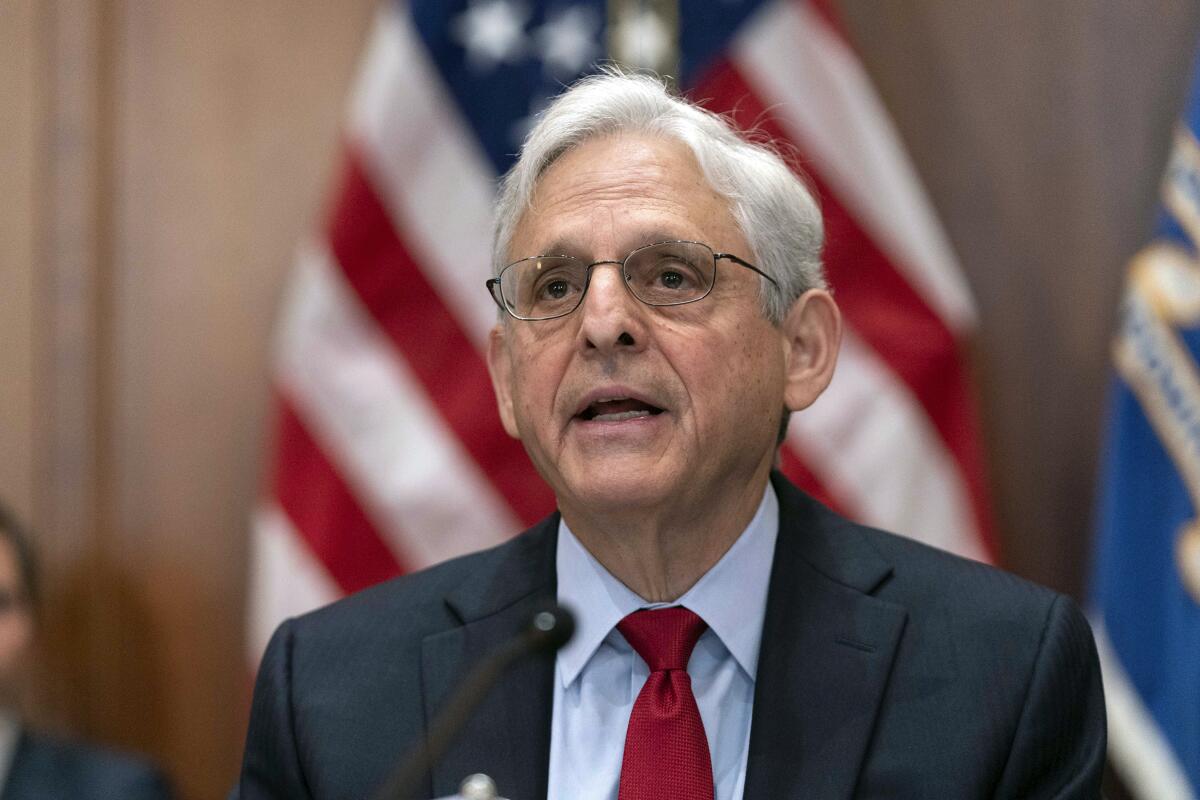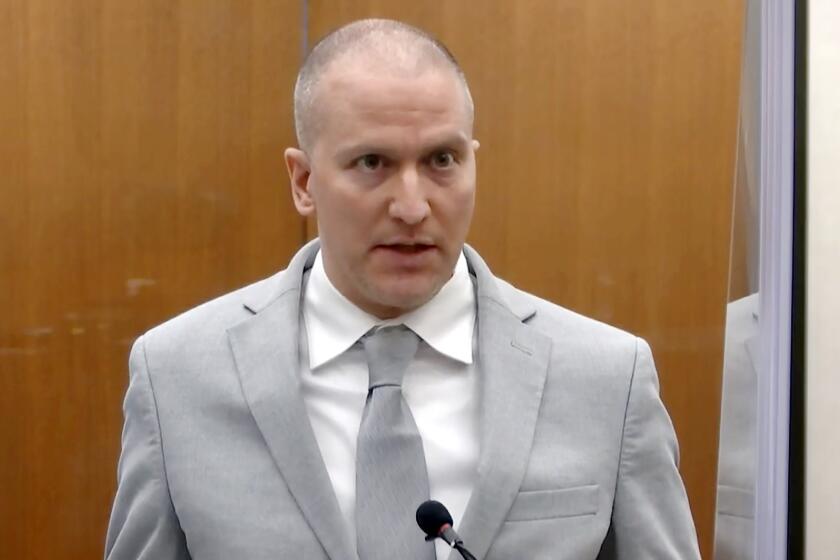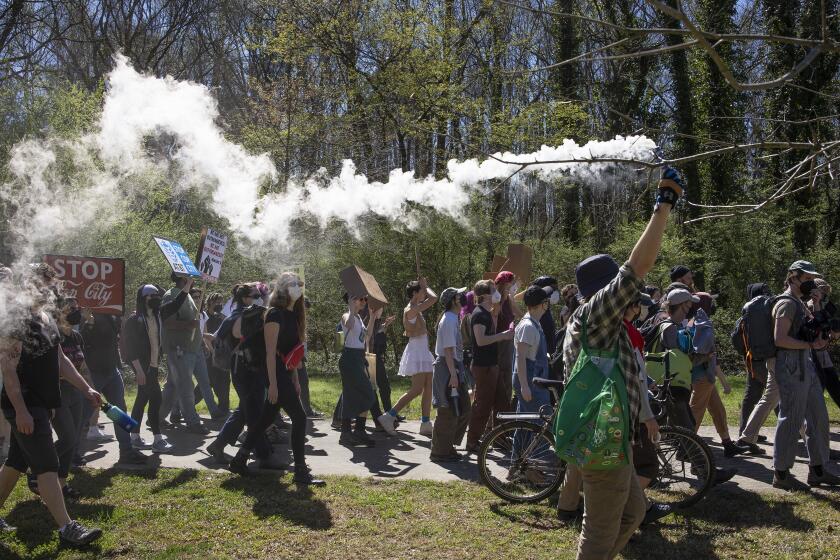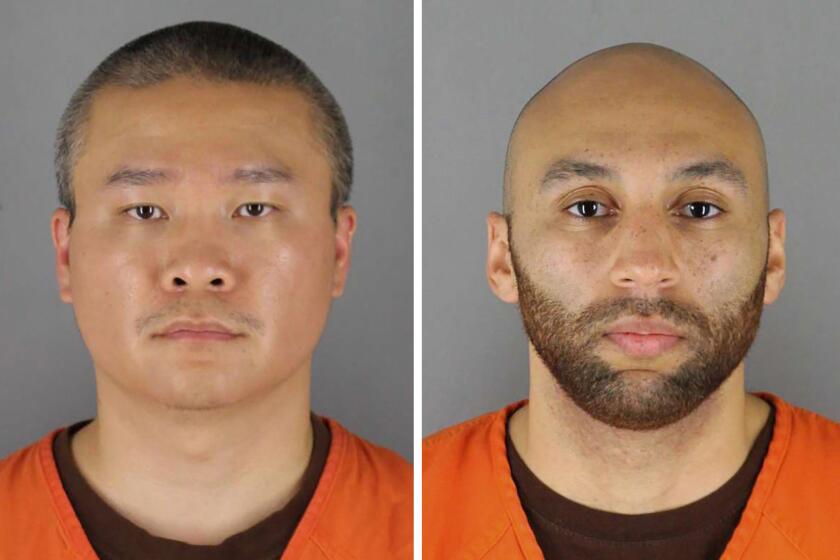George Floyd’s killing capped years of violence, discrimination by Minneapolis police, Justice Dept. says

- Share via
MINNEAPOLIS — The Justice Department on Friday issued a withering critique of Minneapolis police, alleging that they systematically discriminated against racial minorities, often violated constitutional rights and disregarded the safety of people in custody for years before George Floyd was killed.
The report was the result of a sweeping two-year probe, and it confirmed many of the citizen complaints about police conduct that emerged after Floyd’s death in 2020. The investigation found that Minneapolis officers used excessive force, including “unjustified deadly force,” and violated the rights of people engaged in constitutionally protected speech.
The inquiry also concluded that both police and the city discriminated against Black and Native American people and those with “behavioral health disabilities.”
“We observed many MPD officers who did their difficult work with professionalism, courage and respect,” Atty. Gen. Merrick Garland told a news conference in Minneapolis. “But the patterns and practices we observed made what happened to George Floyd possible.”
Garland said officers routinely disregarded the safety of people in custody, noting numerous examples in which someone complained that they could not breathe, only to have officers reply with a version of “You can breathe. You’re talking right now.”
Former police officer Derek Chauvin’s second-degree murder conviction for the killing of George Floyd is upheld by the Minnesota Court of Appeals.
Police “used dangerous techniques and weapons against people who committed at most a petty offense and sometimes no offense at all,” the report said. Officers “used force to punish people who made officers angry or criticized the police.”
Police also “patrolled neighborhoods differently based on their racial composition and discriminated based on race when searching, handcuffing or using force against people during stops,” according to the report.
As a result of the investigation, the city and the police department agreed to a deal known as a consent decree, which will require reforms to be overseen by an independent monitor and approved by a federal judge. That arrangement is similar to reform efforts in Seattle, New Orleans, Baltimore, Chicago and Ferguson, Mo.
Consent decrees require agencies to meet specific goals before federal oversight is removed, a process that often takes many years at a cost of millions of dollars.
Terrence Floyd, a younger brother of George Floyd, praised the Justice Department for its review.
“That’s how you solve and stop what’s going on with law enforcement,” said Floyd, who is based in Brooklyn, N.Y.
Police Chief Brian O’Hara said his agency was committed to creating “the kind of police department that every Minneapolis resident deserves.”
Kim Potter, the Minnesota police officer who mistook her gun for a Taser and killed Daunte Wright in 2021, was released from prison early Monday.
Mayor Jacob Frey acknowledged the work ahead.
“We understand that change is nonnegotiable,” Frey said. “Progress can be painful, and the obstacles can be great. But we haven’t let up in the three years since the murder of George Floyd.”
The scathing report reflected Garland’s efforts to prioritize civil rights and policing nationwide. Similar investigations of police departments have been undertaken in Louisville, Phoenix and Memphis, among other cities.
The Minneapolis investigation was launched in April 2021, a day after former officer Derek Chauvin, who is white, was convicted of murder and manslaughter in the killing of Floyd, who was Black.
During their May 25, 2020, encounter, Floyd repeatedly said he couldn’t breathe before going limp as Chauvin pressed his knee into Floyd’s neck for 9½ minutes. The killing was recorded by a bystander and sparked months of mass protests as part of a broader national reckoning over racial injustice.
The Justice Department reviewed police practices dating back to 2016, and found that officers sometimes shot at people without determining whether there was an immediate threat.
Officers also used neck restraints like the one Chauvin used on Floyd nearly 200 times from Jan. 1, 2016, to Aug. 16, 2022, including 44 instances that did not require an arrest. Some officers continued to use neck restraints after they were banned following Floyd’s killing, the report said.
Atlanta officials say a new training center would ‘reimagine’ policing. Activists say it would teach police urban warfare and destroy public forests.
The investigation found that Black drivers in Minneapolis are 6.5 times more likely to be stopped than whites, and Native American drivers are 7.9 times more likely to be pulled over. And police often retaliated against protesters and journalists covering protests, the report said.
The city sent officers to behavioral health-related 911 calls, “even when a law enforcement response was not appropriate or necessary, sometimes with tragic results,” according to the report.
The findings were based on reviews of documents, body camera videos, data provided by the city and police, and rides and conversations with officers, residents and others, the report said.
Some changes have already been made.
The report noted that police are now prohibited from using neck restraints such as the one that killed Floyd. Officers are no longer allowed to use some crowd control weapons without permission from the chief. “No-knock” warrants were banned after the 2022 death of Amir Locke.
The city has also launched a program in which trained mental health professionals respond to some calls rather than police.
Keisha Deonarine, director of opportunity, race and justice for the NAACP, applauded the Justice Department for holding police accountable but said much work remains, and not just in Minneapolis.
The former Minneapolis police officer who held down George Floyd’s back as one of his colleagues knelt on the Black man’s neck has been sentenced to 3½ years in prison.
“This is a constant issue across the nation,” Deonarine said. “When you look at the police system, it’s a militarized system. It is absolutely not used, utilized or trained in the way that it should be.”
The Justice Department is not alone in uncovering problems.
A similar investigation by the Minnesota Department of Human Rights found “significant racial disparities with respect to officers’ use of force, traffic stops, searches, citations, and arrests.” It criticized “an organizational culture where some officers and supervisors use racist, misogynistic and disrespectful language with impunity.”
The federal report recommends 28 “remedial” steps to improve policing as a prelude to the consent decree. Garland said the steps “provide a starting framework to improve public safety, build community trust and comply with the constitution and federal law.”
The mayor said city leaders want a single monitor to oversee both the federal plan and the state agreement to avoid having “two different determinations of whether compliance has been met or not. That’s not a way to get to clear and objective success.”
Floyd, 46, was arrested on suspicion of passing a counterfeit $20 bill for a pack of cigarettes at a corner market. He struggled with police when they tried to put him in a squad car, and though he was already handcuffed, they forced him on the ground.
Chauvin was sentenced to 22½ years for murder. He also pleaded guilty to a federal charge of violating Floyd’s civil rights and was sentenced to 21 years in that case. He is serving those sentences in Tucson.
Salter reported from O’Fallon, Mo.. Associated Press writers Lindsay Whitehurst in Washington, Aaron Morrison in New York and Summer Ballentine in Columbia, Mo., contributed to this report.
More to Read
Sign up for Essential California
The most important California stories and recommendations in your inbox every morning.
You may occasionally receive promotional content from the Los Angeles Times.

















